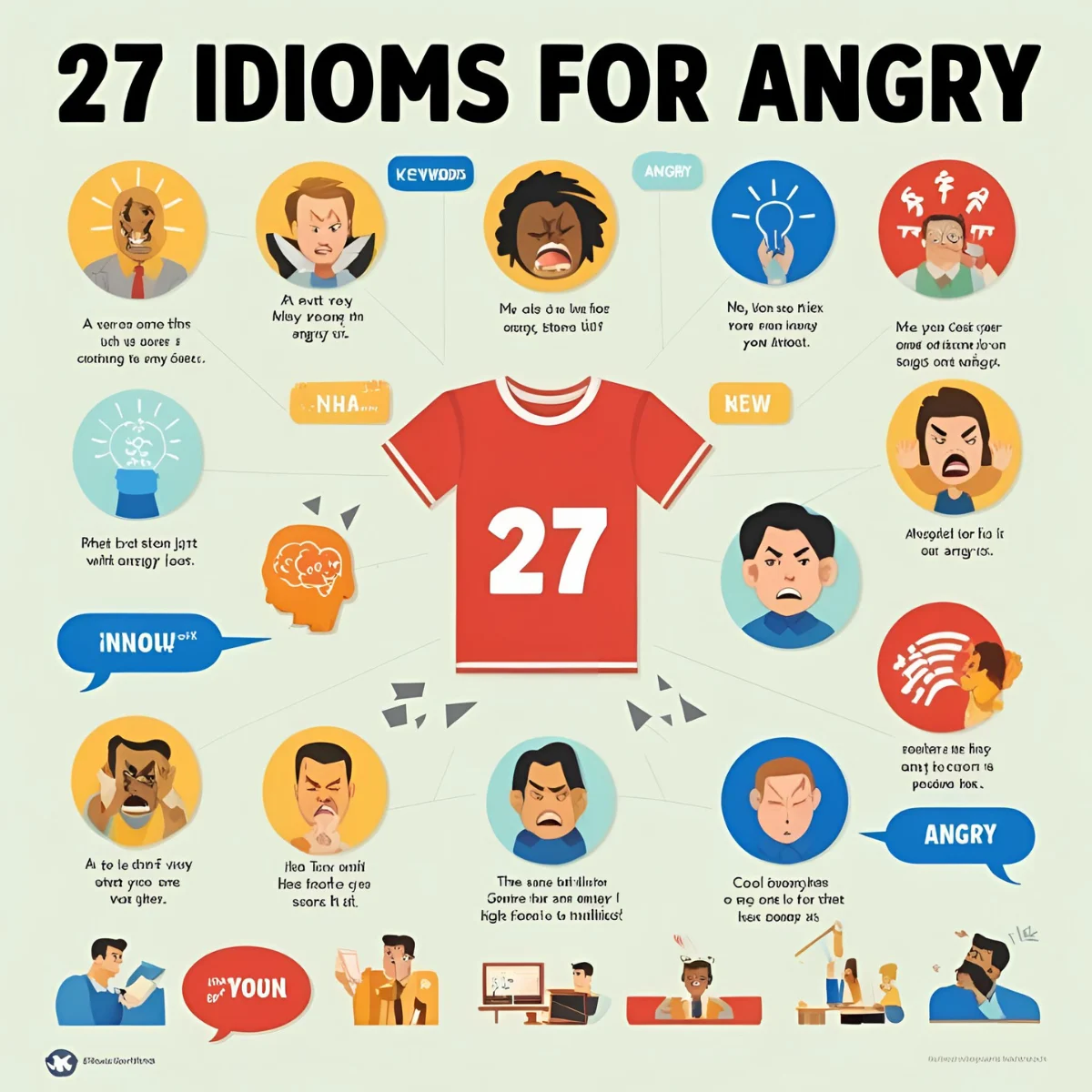Anger is a powerful emotion, and English has plenty of colorful idioms to describe it. From “blowing a fuse” to “seeing red,” these expressions add flavor and intensity to everyday language. Idioms for anger go beyond just saying someone is mad—they paint vivid pictures of frustration, rage, or irritation.
Whether you’re learning English or just want to sound more natural, knowing these idioms can help you express emotions more effectively. In this article, we’ll explore 27 popular idioms that all relate to being angry, complete with meanings and examples.
1. Blow a Gasket
Meaning: To become extremely angry.
Example: “My dad blew a gasket when he saw the car scratched.”
Tone: Explosive, sudden.
Other ways to say it: Lose control, go mad.
2. Fly into a Rage
Meaning: To suddenly become very angry.
Example: “She flew into a rage when she found out the truth.”
Tone: Sudden, uncontrollable.
Other ways to say it: Go off, lose it.
3. Hit the Roof
Meaning: To react with extreme anger.
Example: “My boss hit the roof when I missed the deadline.”
Tone: Intense, furious.
Other ways to say it: Explode, go ballistic.
4. See Red
Meaning: To become so angry that you lose control.
Example: “I saw red when he insulted my family.”
Tone: Fiery, immediate.
Other ways to say it: Boil with anger, rage.
5. Be Up in Arms
Meaning: To be very upset about something unfair.
Example: “The community was up in arms over the new policy.”
Tone: Protest-like, frustrated.
Other ways to say it: Enraged, furious.
6. Bite Someone’s Head Off
Meaning: To respond in an overly angry manner.
Example: “I just asked a simple question, no need to bite my head off!”
Tone: Irritable, short-tempered.
Other ways to say it: Snap at, lash out.
7. Go Ballistic
Meaning: To react with extreme, uncontrollable anger.
Example: “She went ballistic when she found out she was overcharged.”
Tone: Explosive, dramatic.
Other ways to say it: Blow up, freak out.
8. Blow One’s Top
Meaning: To lose one’s temper completely.
Example: “He blew his top when they changed the schedule without asking.”
Tone: Sudden, intense.
Other ways to say it: Erupt, lose control.
9. Throw a Fit
Meaning: To have an outburst of anger.
Example: “He threw a fit when his request was denied.”
Tone: Childish, dramatic.
Other ways to say it: Have a meltdown, freak out.
10. Get Bent Out of Shape
Meaning: To become overly upset about something small.
Example: “Don’t get bent out of shape over a little mistake.”
Tone: Overreacting, annoyed.
Other ways to say it: Overreact, get worked up.
11. Storm Off
Meaning: To leave angrily.
Example: “She stormed off after the argument.”
Tone: Dramatic, frustrated.
Other ways to say it: Walk out, leave in a huff.
12. Make One’s Blood Boil
Meaning: To cause someone extreme anger.
Example: “His arrogance makes my blood boil.”
Tone: Furious, deep resentment.
Other ways to say it: Infuriate, enrage.
13. Have a Short Fuse
Meaning: To get angry quickly.
Example: “Be careful what you say—he has a short fuse.”
Tone: Quick-tempered, irritable.
Other ways to say it: Hot-tempered, easily angered.
14. At the End of One’s Rope
Meaning: To be out of patience.
Example: “I’m at the end of my rope with these constant delays.”
Tone: Stressed, frustrated.
Other ways to say it: Fed up, about to lose it.
15. Throw a Tantrum
Meaning: To have an exaggerated angry reaction.
Example: “He threw a tantrum when he didn’t get what he wanted.”
Tone: Childish, immature.
Other ways to say it: Act out, have a meltdown.
16. Fuming
Meaning: Silently but intensely angry.
Example: “He was fuming after losing the deal.”
Tone: Quiet but simmering.
Other ways to say it: Stewing, simmering.
17. At Boiling Point
Meaning: To be on the verge of exploding with anger.
Example: “She was at boiling point after being ignored all day.”
Tone: On edge, ready to snap.
Other ways to say it: About to explode, on the brink.
18. Gnash One’s Teeth
Meaning: To express anger through gritted teeth.
Example: “He gnashed his teeth when he heard the bad news.”
Tone: Silent but fuming.
Other ways to say it: Grind one’s teeth, seethe.
19. Have Steam Coming Out of One’s Ears
Meaning: To look visibly angry.
Example: “She had steam coming out of her ears when she found out about the mistake.”
Tone: Cartoonishly furious.
Other ways to say it: Fuming, red-faced.
20. Hit the Ceiling
Meaning: To become extremely angry.
Example: “He hit the ceiling when he found out he was overcharged.”
Tone: Furious, immediate.
Other ways to say it: Blow up, snap.
21. Burn with Rage
Meaning: To feel extreme anger inside.
Example: “She burned with rage when she saw the unfair decision.”
Tone: Intense, slow-building.
Other ways to say it: Seething, boiling.
22. Jump Down Someone’s Throat
Meaning: To react aggressively to someone’s words.
Example: “I just made a suggestion, no need to jump down my throat!”
Tone: Defensive, aggressive.
Other ways to say it: Snap at, lash out.
23. Lose One’s Rag
Meaning: To suddenly lose one’s temper.
Example: “He lost his rag when the internet went down again.”
Tone: Sudden, uncontrolled.
Other ways to say it: Blow up, freak out.
24. Drive Someone Up the Wall
Meaning: To irritate someone intensely.
Example: “His constant humming is driving me up the wall!”
Tone: Annoyed, frustrated.
Other ways to say it: Get on someone’s nerves, make wild.
25. Kick Up a Fuss
Meaning: To make a big deal out of something.
Example: “He kicked up a fuss when they wouldn’t refund him.”
Tone: Exaggerated, dramatic.
Other ways to say it: Make a scene, complain loudly.
26. Go Off the Deep End
Meaning: To react with extreme anger or distress.
Example: “She went off the deep end when she lost her phone.”
Tone: Out of control, overdramatic.
Other ways to say it: Freak out, explode.
27. Throw One’s Toys Out of the Pram
Meaning: To react angrily in a childish way.
Example: “He threw his toys out of the pram when he didn’t get his way.”
Tone: Immature, overreacting.
Other ways to say it: Have a tantrum, overreact.
Conclusion
Understanding idioms for anger not only helps you grasp native English but also makes your communication more expressive and relatable. These 27 phrases cover a range of emotions, from mild annoyance to full-blown fury.
The next time you’re “fed up” or feel like you’re “boiling over,” you’ll know exactly how to describe it with style. Keep practicing them in real-life conversations to build fluency and confidence. Language is powerful—and with the right idioms, your emotions can speak louder than ever.



